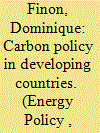|
|
|
Sort Order |
|
|
|
Items / Page
|
|
|
|
|
|
|
| Srl | Item |
| 1 |
ID:
166989


|
|
|
|
|
| Summary/Abstract |
Carbon pricing might not be appropriate as the main element of the carbon policy package in emerging and developing countries (DCs), because the political economy constraints are greater than in developed countries. Non-price instruments and policies such as efficiency standards, market-oriented regulation, subsidies for clean technologies and public programs involving low carbon infrastructure should be preferentially developed to deal with market and regulatory failures, which are more widespread than in developed countries. These approaches are most effective in orientating technology and infrastructure, the principal means to achieving the mitigation imperative in DCs. Moreover, even if, in theory, policy packages using non-price instruments are less socially efficient than those focused on carbon pricing, they allow governments to circumvent political economy constraints, because their costs to consumers and citizens are not generalized and tend to be much less visible, while their redistributive effects are, if appropriately designed, generally not too regressive. In the end, developing a carbon policy that emphasizes non-price instruments and measures will pave the way to leverage carbon pricing as the main pillar of their future carbon policy in long term.
|
|
|
|
|
|
|
|
|
|
|
|
|
|
|
|
| 2 |
ID:
088966


|
|
|
|
|
| Publication |
2009.
|
| Summary/Abstract |
In countries with a significant amount of low variable cost generation capacity, the integration of electricity markets poses a real problem with respect to consumers' interests. In such cases, consumers face a significant price rise compared with consumers in countries where low-cost capacities are lacking. This paper analyses this problem both in the short and long term, focusing on a market dominated by nuclear and hydro production. When there are too many restrictions on new capacity developments in low-cost technologies, market integration will lead to surplus redistribution without any production reallocation. This really makes it legitimate to contemplate redistributive compensations towards local consumers in countries which benefited from low variable cost generators at the moment of liberalisation. This paper examines two alternative ways of rent reallocation, one by income with a windfall tax on nuclear producers and the allocation of this revenue to energy efficiency policy funds, and another by price by giving drawing rights on the existing nuclear generators' production to small commercial and domestic consumers, at a level equivalent to the one necessary to maintain regulated prices.
|
|
|
|
|
|
|
|
|
|
|
|
|
|
|
|
| 3 |
ID:
092844


|
|
|
|
|
| Publication |
2009.
|
| Summary/Abstract |
The power system capacity adequacy has public good features that cannot be entirely solved by electricity markets. Regulatory intervention is then necessary and established methods have been used to assess adequacy and help regulators to fix this market failure. In regional electricity markets, transmission interconnections play an important role in contributing to adequacy. However, the adequacy problem and related policy are typically considered at a national level. This paper presents a simple model to study how the interconnection capacity interacts with generation adequacy. First results indicate that increasing interconnection capacity between systems improves adequacy up to a certain level; further increases do not procure additional adequacy improvements. Furthermore, besides adequacy improvement, increasing transmission capacity under asymmetric adequacy criteria or national system characteristics could create several concerns about externalities. These results imply that regional coordination of national adequacy policies is essential to internalise adequacy of cross-border effects.
|
|
|
|
|
|
|
|
|
|
|
|
|
|
|
|
| 4 |
ID:
105735


|
|
|
|
|
| Publication |
2011.
|
| Summary/Abstract |
This paper deals with the practical problems related to long-term security of supply in regional electricity markets with transmission constraints. Differences between regulatory policies and market designs in terms of generation adequacy policies may distort the normal functioning of the neighboring markets, as well as the reliability of supply. We test the effect of heterogeneous regulatory design between two interdependent markets: energy-only market, price-capped market without capacity mechanisms and price-capped markets with forward capacity contracts obligation. We rely on a long-term market simulation model in system dynamics that characterizes expansion decision in a competitive regime. The results show that differences in market designs affect both price and reliability of supply in the two markets. We examine both the short and long terms effect, and how free-riding may occur where capacity adequacy policies are adopted in one market but not the other. The main finding is that the lack of harmonization between local markets in policies to ensure capacity adequacy may lead to undesirable side effects.
|
|
|
|
|
|
|
|
|
|
|
|
|
|
|
|
| 5 |
ID:
125561


|
|
|
|
|
| Publication |
2013.
|
| Summary/Abstract |
This paper deals with the practical problems related to long-term security of supply in electricity markets in the presence of large-scale wind power development. The success of recent renewable promotion schemes adds a new dimension to ensuring long-term security of supply: it necessitates designing second-best policies to prevent large-scale wind power development from distorting long-run equilibrium prices and investments in conventional generation and in particular in peaking units. We rely upon a long-term simulation model which simulates electricity market players' investment decisions in a market regime and incorporates large-scale wind power development in the presence of either subsidized or market driven development scenarios. We test the use of capacity mechanisms to compensate for long-term effects of large-scale wind power development on prices and reliability of supply. The first finding is that capacity mechanisms can help to reduce the social cost of large scale wind power development in terms of decrease of loss of load probability. The second finding is that, in a market-based wind power deployment without subsidy, wind generators are penalised for insufficient contribution to the long term system's reliability.
|
|
|
|
|
|
|
|
|
|
|
|
|
|
|
|
|
|
|
|
|